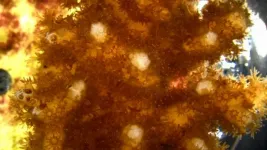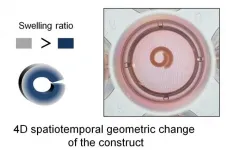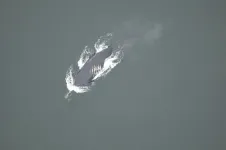(Press-News.org) Baby mice might be small, but they're tough, too.
For their first seven days of life, they have the special ability to regenerate damaged heart tissue.
Humans, on the other hand, aren't so lucky: any heart injuries we suffer could lead to permanent damage. But what if we could learn to repair our hearts, just like baby mice?
A team of researchers led by UNSW Sydney have developed a microchip that can help scientists study the regenerative potential of mice heart cells. This microchip - which combines microengineering with biomedicine - could help pave the way for new regenerative heart medicine research.
The study is featured on the cover of today's issue of the journal Small.
"We've developed a simple, reliable, cheap and fast way to identify and separate these important mouse heart cells," says lead author Dr Hossein Tavassoli, a biomedical engineer and stem cell researcher at UNSW Medicine & Health who conducted this work as part of his doctoral thesis.
"Our method uses a microchip that's easy to fabricate and can be made in any laboratory in the world."
The process for identifying and separating mice heart cells is rather complex.
First, scientists need to separate the right kind of heart cells (called proliferative cardiomyocytes) from other types of cells present in the heart.
Their next challenge is keeping the cells alive.
"Newborn mice heart cells (called proliferative cardiomyocytes) are very sensitive," says Dr Vashe Chandrakanthan, a senior research fellow at UNSW Medicine & Health and co-senior author of the study.
"Only about 20 per cent usually survive the conventional isolation and separation process. If we want to study these cells, we need to isolate them before they undergo cell death."
Dr Tavassoli says that this new method is much more efficient.
"We reduced the stress applied on these cells by minimising the isolation and processing time," he says. "Our method can purify millions of cells in less than 10 minutes.
"Almost all of the cells survived when we used our microfluidic chip - over 90 per cent."
The spiral-shaped device is a microfluidic chip - that is, a chip designed to handle liquids on tiny scale. It filters cells according to their size, separating the cardiomyocytes from other cells. The chip costs less than $500 to produce, making it cheaper than other isolation and separation methods.
This tool will make it easier for researchers to study how baby mice repair their hearts - and whether humans might be able to use the same technique.
"Heart disease is the number one killer in the world," says Dr Tavassoli. "In Australia, someone dies of heart disease every 12 minutes, and every four hours a baby is born with a heart defect.
"We hope that our device will help accelerate heart disease research."
Characterising mice heart cells
Once the heart cells were separated from other cells with the help of their chip, the researchers seized the opportunity to study the cells' physico-mechanical properties - that is, the way they respond to force.
This involved asking questions like 'How do these individual heart cells beat?', 'Do the cells have distinct features?' and 'What are their differences in size, shape and elasticity?'.
The findings could provide new insights for developing materials that repair heart tissue, like cardiac patches, scaffolds and hydrogels.
"The fast, large-scale characterisation of cells' physico-mechanical features is a relatively new field of research," says Dr Tavassoli, who originally trained as an engineer before specialising in medicine.
"This is the first time microfluidic technology has been used to study mechanical properties of baby mouse heart cells."
A multipurpose microchip
Dr Chandrakanthan says that even though the microchip was created for baby mouse heart cells, it could potentially be adapted for use in other types of cell applications.
"The principles are compatible with isolating cardiomyocytes from mouse heart cells of all ages," he says.
"We could potentially also use this method to separate not only the heart cells, but all sorts of cells from different organs."
Dr Tavassoli says this method could also help other areas of medical research, including cardiac biology, drug discovery and nanoengineering. He is currently conducting research at the Garvan Institute and Lowy Cancer Research Centre on how this method could help cancer diagnosis.
"This microchip opens up the opportunity for new discoveries by researchers all over the world," he says.
INFORMATION:
BROOKLYN, New York, Wednesday, February 24, 2021 - Travel bans have been key to efforts by many countries to control the spread of COVID-19. But new research aimed at providing a decision support system to Italian policy makers, recently published in the Journal of the Royal Society Interface, suggests that reducing individual activity (i.e., social distancing, closure of non-essential business, etc.) is far superior in controlling the dissemination of Sars-CoV-2, the virus that causes COVID-19.
The research, which has implications for the United States and other countries, found that limiting personal mobility through travel restrictions and similar tactics is effective only in the first phases of the epidemic, and reduces in proportion to the ...
MIAMI--Researchers have perfected the recipe for keeping sea anemone and coral cells alive in a petri dish for up to 12 days. The new study, led by scientists at the University of Miami (UM) Rosenstiel School of Marine and Atmospheric Science, has important applications to study everything from evolutionary biology to human health.
Cnidarians are emerging model organisms for cell and molecular biology research. Yet, successfully keeping their cells in a laboratory setting has proved challenging due to contamination from the many microorganisms that live within these marine organisms or because the whole tissue survive in a culture environment.
UM cell ...
New hydrogel-based materials that can change shape in response to psychological stimuli, such as water, could be the next generation of materials used to bioengineer tissues and organs, according to a team of researchers at the University of Illinois Chicago.
In a new paper published in the journal Advanced Functional Materials, the research team -- led by Eben Alsberg, the Richard and Loan Hill Professor of Biomedical Engineering -- that developed the substances show that the unique materials can curl into tubes in response to water, making the materials good candidates for bioengineering blood vessels or other tubular structures.
In nature, embryonic development and tissue healing often involve ...
PROVIDENCE, R.I. [Brown University] -- Volcanic rock samples collected during NASA's Apollo missions bear the isotopic signature of key events in the early evolution of the Moon, a new analysis found. Those events include the formation of the Moon's iron core, as well as the crystallization of the lunar magma ocean -- the sea of molten rock thought to have covered the Moon for around 100 million years after the it formed.
The analysis, published in the journal Science Advances, used a technique called secondary ion mass spectrometry (SIMS) to study volcanic glasses returned ...
While COVID-19-related lockdowns may have decreased the spread of a deadly virus, they appear to have created an ideal environment for increased domestic violence.c
Data collected in surveys of nearly 400 adults for 10 weeks beginning in April 2020 suggest that more services and communication are needed so that even front-line health and food bank workers, for example -- rather than only social workers, doctors and therapists -- can spot the signs and ask clients questions about potential intimate partner violence. They could then help lead victims to resources, said Clare Cannon, assistant professor of social and environmental justice in the Department of Human Ecology and the lead author of the study.
The paper, "COVID-19, intimate partner violence, and communication ...
BOSTON - Swelling of lymph nodes in the armpit area is a normal response to COVID-19 vaccinations, but when they are seen on mammograms, they can be mistaken for nodes that are swollen because of cancer. In some cases, the nodes are biopsied to confirm they are not cancer. To avoid confusion by patients and their providers, and to avoid delays in either vaccinations or recommended mammograms through the pandemic, radiologists at Massachusetts General Hospital (MGH) have published an approach to manage what is expected to be a fairly common occurrence as vaccination programs ramp up. The approach is described in the American Journal of Roentgenology.
"We had started ...
A new study from North Carolina State University reveals that the soundscapes of coral reef ecosystems can recover quickly from severe weather events such as hurricanes. The work also demonstrates that non-invasive monitoring is an important tool in shedding further light on these key ecosystems.
Soundscape ecology is a relatively new way for researchers to keep tabs on a variety of habitats without direct interference. In underwater habitats like coral reefs, soundscapes allow continual monitoring of an ecosystem that is difficult to access. By deploying underwater microphones, or hydrophones, researchers can get an acoustic picture of the types of animals in the ecosystem, as well as their behavior patterns.
Kayelyn Simmons, a Ph.D. student at NC State, used soundscapes and ...
NASA's Parker Solar Probe captured stunning views of Venus during its close flyby of the planet in July 2020.
Though Parker Solar Probe's focus is the Sun, Venus plays a critical role in the mission: The spacecraft whips by Venus a total of seven times over the course of its seven-year mission, using the planet's gravity to bend the spacecraft's orbit. These Venus gravity assists allow Parker Solar Probe to fly closer and closer to the Sun on its mission to study the dynamics of the solar wind close to its source.
But -- along with the orbital dynamics -- these passes can also yield some unique and even unexpected views of the inner solar system. During the mission's third ...
Evolutionary expert Charles Darwin and others recognized a close evolutionary relationship between humans, chimps and gorillas based on their shared anatomies, raising some big questions: how are humans related to other primates, and exactly how did early humans move around? Research by a Texas A&M University professor may provide some answers.
Thomas Cody Prang, assistant professor of anthropology, and colleagues examined the skeletal remains of Ardipithecus ramidus ("Ardi"), dated to 4.4 million years old and found in Ethiopia. One of Ardi's hands was exceptionally well-preserved.
The researchers compared the shape of Ardi's hand to hundreds of other hand specimens representing recent humans, apes and monkeys (measured ...
A study co-authored by scientists at the New England Aquarium has found that known deaths of critically endangered North Atlantic right whales represent a fraction of the true death toll. This comes as the death of a calf and recent sightings of entangled right whales off the southeastern United States raise alarm.
The study, published this month in END ...



